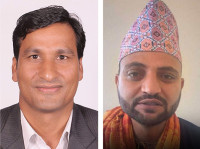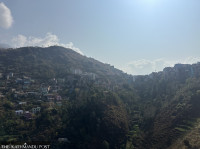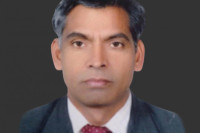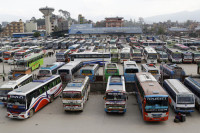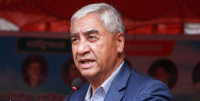National
Did Ukraine call for banning Russians from Nepal’s mountains? No idea, agencies say
As war is making every other thing political, the mountaineering fraternity insists that mountains be kept out of politics.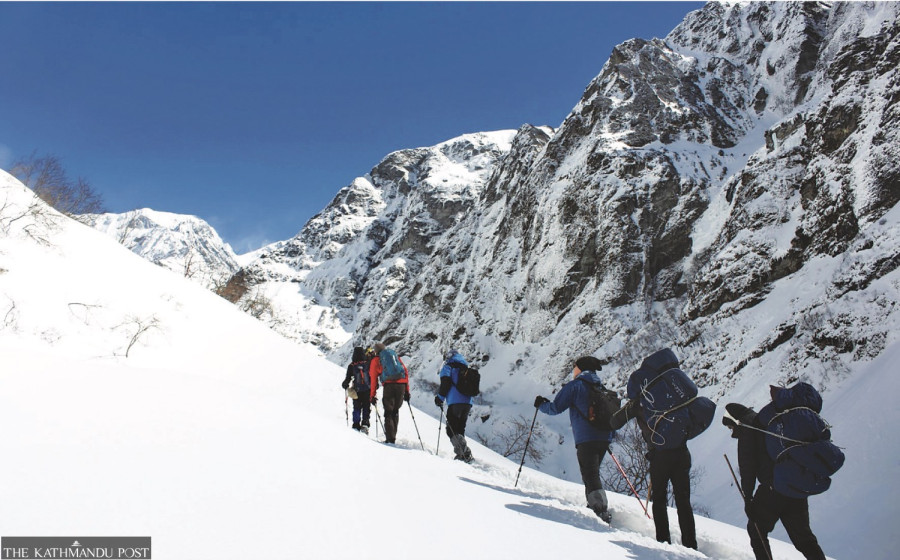
Sangam Prasain
The Russian invasion of Ukraine has made many things political, and there are concerns if Nepal’s mountains too will become political.
In an undated letter that appeared on social media platforms, the Embassy of Ukraine in New Delhi, India, requested Nepal to ban Russian mountaineering teams until the end of the Russian invasion of Ukraine.
“Numerous international sports federations have barred Russian athletes,” reads the letter addressed to the Embassy of Nepal in New Delhi. "Taking into consideration the above, the esteemed Nepalese side is kindly requested to ban Russian mountaineering teams until the end of [the] Russian invasion into Ukraine.”
The letter is cc’ed to the Tourism Ministry, Department of Tourism, Nepal Tourism Board, Nepal Mountaineering Association, Trekking Agencies Association of Nepal and Nepal Association of Tour and Travel Agents.
But most of the agencies the Post spoke to said they have not received any official letter—either from the government or the embassy in Delhi.
Even the Nepali embassy in New Delhi said it is not aware of such a letter.
“We are not aware of such correspondence,” an official from the Nepali embassy in New Delhi told the Post.
The Post could not independently verify the authenticity of the purported Ukrainian letter.
“As we haven’t received any such letter or notice from the government, we have not changed our policy,” said Santa Bir Lama, president of Nepal Mountaineering Association. “We don’t have any say in such a decision. We simply follow government instructions.”
The government has been issuing permits to climb Nepal’s mountains to all those who abide by applicable rules and regulations.
So far nine permits have been issued to Russian climbers.
Nepal Mountaineering Association, the private mountaineering body, has issued eight and the Department of Tourism has issued one permit for the 8,091 metre Annapurna I.
Nepal was among the first countries to oppose the Russian invasion of Ukraine, and it has voted in favour of the eastern European country at two United Nations forums—the General Assembly and the Human Rights Council.
Nepal’s position on the Russia-Ukraine war is strikingly different from that of its giant neighbours India and China.
“We have not received any official notice or statement concerning Ukraine’s request to bar Russian mountaineers,” said Tok Raj Pandey, spokesperson for the Tourism Ministry.
Surya Prasad Upadhyaya, director at the Department of Tourism, also said they have not received any communication regarding Ukraine’s request and that the higher authority (Tourism Ministry) needs to take a decision if climbing permits for Russian climbers were to be stopped.
“Until we receive an official letter, there is no change in our policy,” Upadhyaya told the Post.
Nepal and Ukraine established diplomatic relations on January 15, 1993. Nepali embassy in Berlin is concurrently accredited to Ukraine, while the Ukrainian embassy in New Delhi is accredited to Nepal.
When Russia invaded Ukraine, there were around 1,000 Nepalis in the European country. Most of the Nepalis, except those who had taken Ukrainian citizenship, have already left the country.
Though officials said they have not received any official communication, they were of the view that the next step could be decided only after they see the letter.
Ukraine’s call on Nepal to bar Russian mountaineers comes amid various measures by some groups and countries to isolate Russia. The West has imposed sanctions on Russia. In the US, many have boycotted Russian vodka. Small and large US cities have cut their ties with “Russian sister cities”.
According to the New York Times, a group in Brussels last week disqualified Russia’s candidate—an oak tree said to have been planted 198 years ago by the novelist Ivan Turgenev—from the European Tree of the Year competition “in a symbolic effort to isolate Russia.”
A space industry conference this month removed the name of celebrated Soviet cosmonaut Yuri Gagarin, the first human to travel into space, from an event.
“In light of current world events,” said the nonprofit Space Foundation, it would be changing the name of a fundraiser from “Yuri’s Night” to “A Celebration of Space: Discover What’s Next” at its Space Symposium conference.
On February 28, Russia was expelled from the 2022 World Cup and its teams suspended from all international football competitions “until further notice” after President Vladimir Putin’s invasion of Ukraine, FIFA announced in a joint statement with the Union of European Football Associations.
The men’s team had been due to play in qualifying playoffs in March for the World Cup in Qatar later this year, while its women’s side had qualified for the European Championship in England, to be held in July.
On March 18, the Court of Arbitration for Sport refused to suspend FIFA’s ban on Russia taking part in the playoffs for the 2022 World Cup finals over the invasion of Ukraine. CAS, sport’s top court, is still to rule on the legal basis of the ban, but a decision is not expected for several weeks at least.
The Russia-Ukraine war has had multiple effects across the world, including in Nepal.
The Nepali consumer is becoming an unwitting sufferer of the war as cooking oil prices have risen sharply because shipments were held up at various transit points, traders said.
Analysts say the war has already led to higher petroleum prices, and Nepali consumers reeling from spiralling fuel and food costs will be hurt more from expected hikes in the price of cooking oil.
According to the Department of Customs, Nepal imported 57,360 tonnes of crude sunflower oil worth Rs9.51 billion from Ukraine, and 15,220 tonnes worth Rs2.58 billion from Russia in the first seven months of the current fiscal year. During the same period, Nepal imported 4,840 tonnes of soybean oil worth Rs794.79 million from Ukraine, and 7,840 tonnes of mustard seeds worth Rs753.75 million from Russia.
Even if the government officially receives the Ukrainian letter, officials wonder whether they would oblige to it, for a number of reasons.
While the West considers mountaineering a sports activity, in Nepal, it is one of the key tourism activities as hundreds of mountain communities depend on the spendings made by the foreign climbers.
It is also one of the key revenue generating activities of the government. It costs $35,000 to $90,000 per person to climb Everest, depending on guides, oxygen and other supplies. This amount includes the climbing permit cost of $11,000, which is charged by the Nepal government.
In 2021, Nepal received 2,107 Russian tourists, according to the Department of Immigration.
Nepal’s peaks ranging from 6,000 metres to the planet’s highest 8,848.86 metres is a big draw for climbers around the world. It is climbed in three seasons—spring, autumn and winter.
The spring climbing season usually begins in April and lasts until the end of May, before the pre-monsoon begins. Spring is popular for climbing Everest due to favourable weather conditions.
As of Wednesday, the government has issued climbing permits to 142 climbers, including 23 permits for Everest.
Last spring, despite the Covid pandemic at its peak, Nepal issued nearly 750 permits—with a record 408 permits issued for climbers aspiring to climb the world’s tallest mountain, Mt Everest.
While the government itself issues permits to mountaineering expeditions for Himalayan peaks more than 6,000 metres high, Nepal Mountaineering Association, a private agency, has been allowed to manage 27 small peaks known as “trekking peaks” which range in height from 5,800 to 6,500 metres.
According to the Nepal Mountaineering Association, six permits have been issued for Imja Tse, known as Island Peak, a 6,160 metres mountain in the Sagarmatha National Park. Two permits have been issued for Chulu East (6,584 metres) and Chulu West (6,419 metres) in the Annapurna region.
Nepal’s diplomatic relations with Russia date back to the late 1950s in the Soviet era. Nepal and the then Soviet Union established diplomatic ties on July 20, 1956. Soon after the collapse of the Soviet Union, Nepal extended full and formal diplomatic recognition to the Russian Federation as a sovereign and independent state on December 28, 1991.
The creation of the country’s booming tourism industry also has a link to a Russian man.
Boris Lissanevich, who was born in the Russian Empire, first came to Kathmandu in 1951 at a time when Nepal was still a forbidden country. He also founded Kathmandu's first international hotel, the Royal. It was Lissanevitch who ran a restaurant called Yak & Yeti in Kathmandu, which later was turned into an iconic five-star hotel in Kathmandu.
Those from the mountaineering fraternity say a regime’s action and the people of that country should be viewed differently.
“Russia may have invaded Ukraine and killed people but we should not blame all Russian nationals for the invasion,” said Lama, the president of Nepal Mountaineering Association. “If they come to Nepal to climb mountains, there is nothing to do with Russia’s war. Nepal’s mountains are not a place to do politics.”
Officials at the Trekking Agencies’ Association of Nepal also said they are not aware of any Ukrainian request to ban Russian climbers.
“We know nothing about the issue,” said Khum Bahadur Subedi, president of the Trekking Agencies’ Association of Nepal. “To ban or not to ban, it depends on the government policy. We have no right to stop Russians from visiting. We simply follow government instructions.”
Lama of Nepal Mountaineering Association said the association is a member of the International Climbing and Mountaineering Federation, commonly known by its French name Union Internationale des Associations d'Alpinisme (UIAA), and other international alpine clubs.
“Even if these organisations request us to ban Russian climbers,” said Lama, “we have to take this issue to the government.”




 9.68°C Kathmandu
9.68°C Kathmandu

